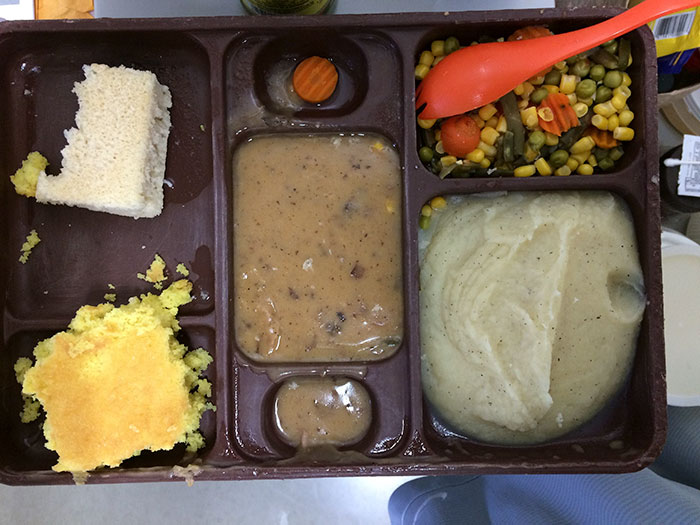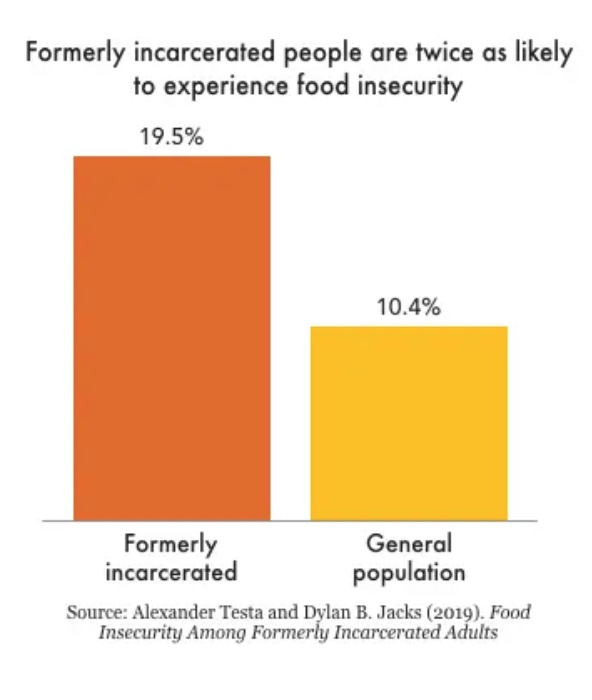In many situations, problem-solving deconstructs to connecting the proverbial dots. Here are our dots:
How do these points connect? Let’s begin with malnutrition causes.
Malnutrition in prisons is due to industrialization and privatization. Industrialization replaced cooking from scratch to reheating processed foods. “When the Department of Corrections turned over responsibility for food services to Correctional Industries…, it substituted 95% industrialized, plastic-wrapped, sugar-filled ‘food products’ for locally prepared healthy food.”

A typical meal in prison. Does this look appetizing to you?
Highly processed and hastily prepared food is due to privatized food services. Nationally most prison food is outsourced by Aramark Correctional Services. Aramark, has been under multiple lawsuits in 2022 for the cleanliness and safety of the food they serve.
Louisiana has the second highest incarceration rate in the United States: 34,000 individuals are incarnated in state prisons, and most of these individuals are people of color. Communities of color also experience high rates of food insecurity. In Louisiana, 32.5 % of African American households experience food insecurity, 30% of Asian households experience food insecurity and 24% of Hispanic households experience food insecurity.
Let me be clear here: Louisiana has the second highest incarceration rate in the United States, and it also has the second highest rate of food insecurity in the nation. Mass incarceration has significantly increased American poverty. Poverty rates would be lowered by 20% if mass incarceration was not a thing. For families who have experienced parental incarceration there is a 4% increase in the likelihood that families will experience food insecurity. 90% of ex inmates experience some form of food insecurity in their lifetime.

Louisiana’s poverty and racial demographics mean that food deserts are very common. There is a lack of access to healthy and affordable food options. Two metropolitan areas—New Orleans-Metairie and Baton Rouge—land in the top ten Metropolitan Statistical Areas in the nation struggling with food insecurity.
The correlation between food insecurity and malnutrition in prisons is due to a lot of factors including recidivism, access to education, job opportunities, rehabilitation services offered after being released, impoverished environments, and access to healthy food. Addressing food insecurity in Louisiana is a social justice issue that deserves high priority from the government, the business community, local activists, and the education community.
No one should be left hungry.
 NOLAbeings
Multimedia artist Claire Bangser created NOLAbeings as a portrait-based story project that marries...
NOLAbeings
Multimedia artist Claire Bangser created NOLAbeings as a portrait-based story project that marries...
 Data corner: Adobe Suite (create a PDF, social media graphic, presentation, edit a photo and video
Data corner is where you go to work with analytics and top tech skills. It takes on everything from PERL and SQL to Canva and Sprout Social.
Data corner: Adobe Suite (create a PDF, social media graphic, presentation, edit a photo and video
Data corner is where you go to work with analytics and top tech skills. It takes on everything from PERL and SQL to Canva and Sprout Social.
